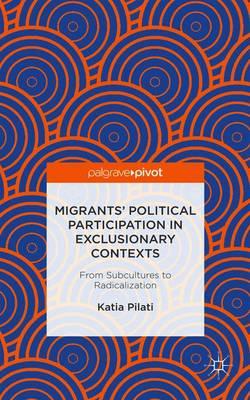Overview
This insightful book analyzes the political engagement and marginalization of three of Milan's migrant groups, Filipinos, Egyptians and Ecuadorians. Bringing together data relating to the civic and political engagement of individual migrants, and of migrant organizational networks, the result is an examination of the consequences of the political exclusion of migrants, exploring the different ways in which they cope with this predicament. Such exclusion, the author argues, has three major impacts. It can transform migrant groups into political subcultures and engender externally-driven participation, but it can also lead to radicalization.
Full Product Details
Author: K. Pilati
Publisher: Palgrave Macmillan
Imprint: Palgrave Pivot
Edition: 1st ed. 2015
Dimensions:
Width: 14.00cm
, Height: 1.10cm
, Length: 21.60cm
Weight: 2.765kg
ISBN: 9781137553591
ISBN 10: 1137553596
Pages: 123
Publication Date: 15 December 2015
Audience:
Professional and scholarly
,
Professional & Vocational
Format: Hardback
Publisher's Status: Active
Availability: In Print

This item will be ordered in for you from one of our suppliers. Upon receipt, we will promptly dispatch it out to you. For in store availability, please contact us.
Reviews
This theoretically-informed comprehensive study by Katia Pilati provides a high quality 'blue print' for empirical research on the political engagement of migrants in cities. By examining Filipino, Egyptian and Ecuadorian communities who face a relatively restrictive political environment in Milan, Pilati unpacks the important story about how organizational networks can 'work' to find a place for migrants on the city-level political landscape. It is a definitive study of the mechanisms through which networks can locate migrant communities within city politics, but goes further and identifies 'outcomes' for their political action: inward group social closure; cooperating with mainstream actors; or radicalization. - Paul Statham, University of Sussex, UK The civic and political engagement of migrants has long been a neglected topic in migration studies. This shortcoming has started to be redressed in recent years. Migrants' Political Participation in Exclusionary Contexts skilfully contributes to this growing literature. Katia Pilati shows us in a concise but effective and persuasive way that the effect of an exclusionary context on the political engagement of migrants is moderated by organizational engagement and networks. While the book focuses on the specific case of Milan, Italy, it offers broader insights on the complex interplay between political context, organizational dynamics, and political participation. - Marco Giugni, University of Geneva, Switzerland
Author Information
Katia Pilati is Assistant Professor at the Department of Sociology and Social Research (DSRS) at the University of Trento, Italy. Her research interests include political participation and immigration, social movements, and political engagement in repressive contexts.




